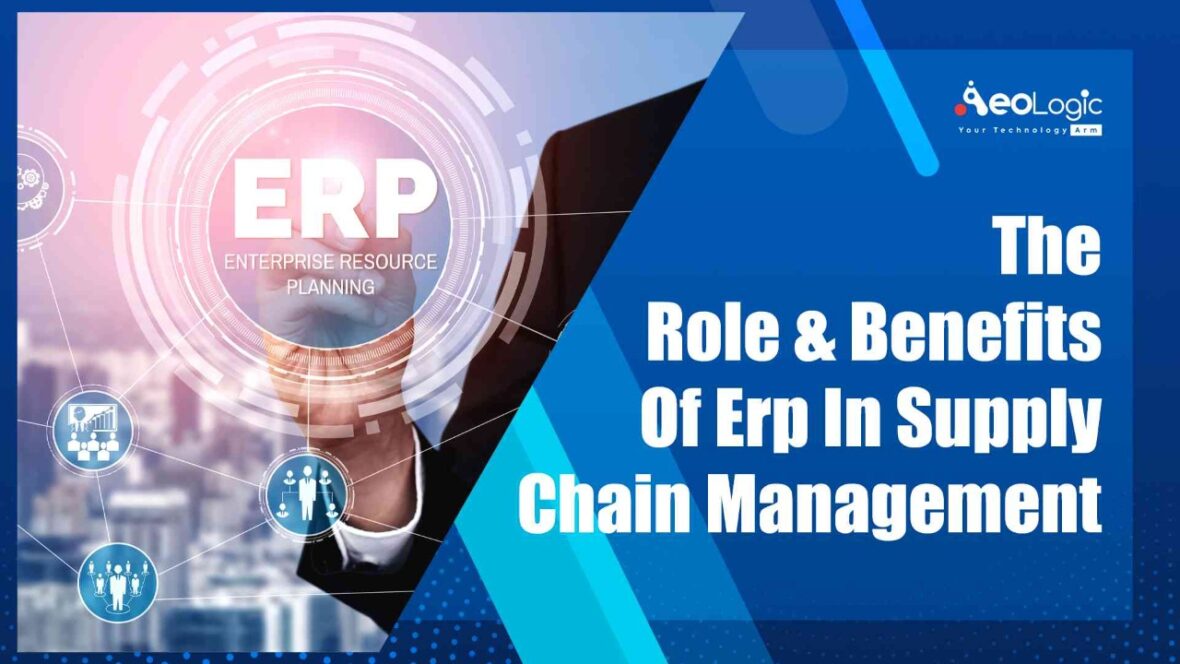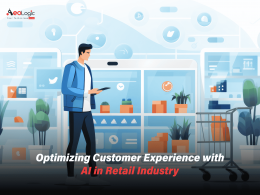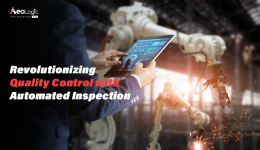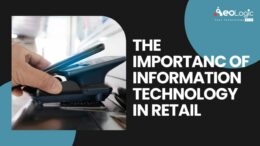ERP is what every business needs to keep in line with industry standards, which is why this blog will focus on just how beneficial ERP can be for businesses. Implementing a supply chain management system is a major decision for many businesses. So, in this blog, we will look at the role & benefits of ERP in supply chain management.
If you’re looking to improve your supply chain and make it more agile, flexible, and responsive to customer needs, then Aeologic Technologies solution providers will often recommend enterprise resource planning. You might be wondering what an ERP system is and how one would help your supply chain, so read on to find out!
Let’s begin!
What is a Supply Chain?
In order to understand the benefits of ERP in Supply Chain Management, it is first important to understand what a supply chain is. A supply chain is a network of facilities and activities that procure materials, transform them into finished goods, and deliver them to customers. The main goal of any supply chain is to meet customer demand in a timely and cost-effective manner.
There are many different factors that need to be managed in a supply chain in order to achieve these goals. These include things like raw materials, production capacity, transportation, warehousing, and inventory. Managing all of these different factors can be a challenge, which is where ERP comes in.
Also Read: The Role of Technology in Disaster Management
Introduction to ERP
ERP stands for Enterprise Resource Planning. It is a software solution that helps businesses manage their operations more effectively. ERP systems provide visibility into all aspects of the business, from procurement to manufacturing to shipping and invoicing. This visibility allows businesses to make more informed decisions about their operations and helps them identify areas where they can improve efficiency and cut costs.
Enterprise resource planning (ERP) is a type of software that helps businesses manage their core operations. In the supply chain management (SCM) context, ERP systems are used to track inventory levels, sales orders, and production data. ERP systems can also be used to optimize production schedules and forecast future demand.
Basic ERP Functionality
ERP systems help businesses manage and automate many key activities related to supply chain management. By integrating information from across the enterprise, ERP systems provide real-time visibility into supply and demand, inventory levels, order status, and other critical data. This enables businesses to make more informed decisions about production planning, procurement, and logistics. In addition, ERP systems can help streamline and automate key supply chain processes such as order fulfillment, warehouse management, and transportation.
ERP systems offer a number of benefits for businesses that want to improve their supply chain management. By providing real-time visibility into key data points, ERP systems can help businesses make more informed decisions about production planning, procurement, and logistics. In addition, ERP systems can help streamline and automate key supply chain processes such as order fulfillment, warehouse management, and transportation.
Also Read: How Digitalization Will Change The Future of Business Technology
Benefits of ERP in Supply Chain Management
The benefits of Enterprise Resource Planning (ERP) in the supply chain management department are numerous. The first and most obvious benefit is that it automates many of the tedious tasks required to set up a company’s supply chain management. It also helps in finding cost-saving opportunities, profit analysis, and managing outsourcing relationships. Read on to know more about the benefits of ERP software for large or small organizations.
Here are some of the ways in which ERP can improve supply chain management:
Increased Visibility
One of the main benefits of ERP is that it provides increased visibility into all aspects of the business. This is especially important in supply chain management, where visibility into inventory levels, supplier performance, and order status is essential. With an ERP system in place, managers can easily track and monitor all aspects of the supply chain, ensuring that potential problems are identified and addressed quickly.
Improved Communication
Another benefit of ERP is that it can help to improve communication throughout the supply chain. With an ERP system in place, all members of the supply chain can easily access information and communicate with each other. So, this improved communication can help to reduce errors and ensure that everyone is on the same page.
Reduce Costs
The rising cost of goods and services is a top concern for businesses across the globe. In fact, according to a recent survey, 37% of respondents said that reducing costs is their top priority. supply chain management (SCM) is a strategic process that can help businesses reduce costs and improve efficiency.
An effective SCM system can help businesses save money in several ways:
- By improving visibility into the supply chain, businesses can identify areas where they are spending too much money.
- With streamlining processes and eliminating waste, businesses can reduce their overall costs.
- By using data and analytics to make better decisions, businesses can save money on inventory, transportation, and other supply chain-related expenses.
Hence, we can say, ERP systems can play a major role in helping businesses achieve these cost savings. By integrating with ERP systems, businesses can get a complete view of their supply chain, from raw materials to finished products. This visibility gives businesses the ability to make improvements that can lead to significant cost savings.
Also Read: Role of Information Technology in Industry 4.0
How do I select the right ERP system for my company?
There are a lot of different ERP systems on the market, and it can be hard to know which one is right for your company.
Here are a few things to consider when making your decision:
- What industry is your company in? Some ERP systems are designed specifically for certain industries, so that’s something to keep in mind.
- What size is your company? Some ERP systems are better suited for large businesses, while others are more suitable for small and medium-sized businesses.
- What’s your budget? ERP systems can vary widely in price, so you’ll need to figure out how much you’re willing to spend before you start looking at options.
- What are your specific needs? Every company has different requirements for its ERP system, so it’s important to sit down and figure out exactly what you need before you start shopping around.
Once you’ve considered all of these factors, you should have a good idea of what kind of ERP system will be right for your company. From there, you can start looking at specific options and find the one that best meets your needs.
Limitations of ERP Systems
ERP systems are not perfect. They have their limitations. One of the biggest limitations is that they can be inflexible. So, if your company’s needs change, you may need to completely re-configure your ERP system or even replace it entirely. This can be costly and time-consuming.
Another limitation is that ERP systems can be complex. They often require specialized knowledge and skills to set up and maintain. This can make them difficult to use for small businesses or businesses with limited IT resources.
Finally, ERP systems can be disruptive. They often require changes to business processes and the way employees work. This can lead to frustration and resistance from employees. It can also slow down business operations during the implementation process.
Also Read: How Machine Learning Can Improve Supply Chain Efficiency
Conclusion
So it’s pretty easy to see that there are many benefits to implementing an ERP system. ERP (Enterprise Resource Planning) systems are the backbone of any successful supply chain. They help businesses organize the resources necessary to manufacture and deliver products, manage employees, provide customer service, and more. The term “ERP” may not roll off the tongue easily, but it is important nonetheless.
Feel free to schedule a free 60-minute consultation with one of our experts. We’ll talk about the opportunities and address any concerns you may have. Our consultants will suggest solutions and outline how they can be implemented. Let’s talk!
Aeologic Technologies is a great place to start!






